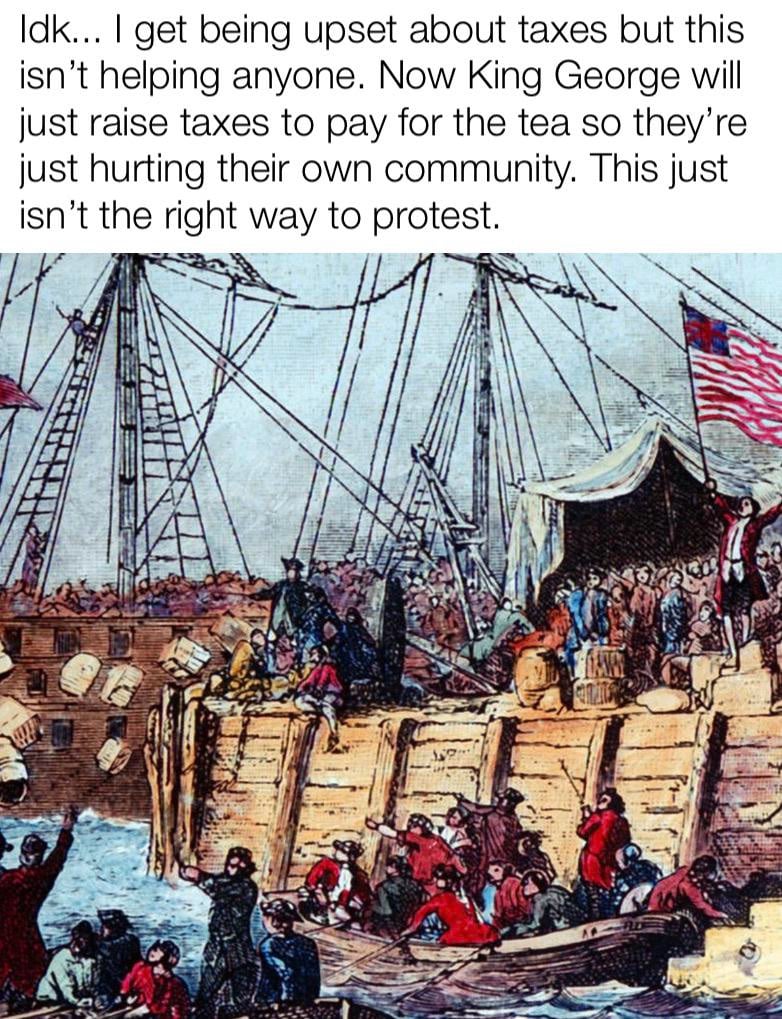this post was submitted on 24 Aug 2024
534 points (94.1% liked)
Political Memes
6236 readers
3443 users here now
Welcome to politcal memes!
These are our rules:
Be civil
Jokes are okay, but don’t intentionally harass or disturb any member of our community. Sexism, racism and bigotry are not allowed. Good faith argumentation only. No posts discouraging people to vote or shaming people for voting.
No misinformation
Don’t post any intentional misinformation. When asked by mods, provide sources for any claims you make.
Posts should be memes
Random pictures do not qualify as memes. Relevance to politics is required.
No bots, spam or self-promotion
Follow instance rules, ask for your bot to be allowed on this community.
founded 2 years ago
MODERATORS
you are viewing a single comment's thread
view the rest of the comments
view the rest of the comments

Do you have a source for that?
https://en.m.wikipedia.org/wiki/Townshend_Acts
Now, my first comment did make it sound like all of this happened in short order, but the back and forth over the Townshend acts went on for a very long time.
But due to those taxes and the efficiency of British naval shipping, smugglers just couldn't compete. They could only beat legal prices if they shipped straight to/from America instead of physically routing all goods thru England.
It wasn't just about taxes, it was merchants in England getting their cut. First crack at goods out of America, and a chance to beat prices on what was going into America.
I'm not sure if that's the part you wanted me to source though. I touched on a bunch of things in a summary from memory, it would take a lot of effort to go back and cite a source for every piece of information I just spit out.
So I'm not doubling down and saying I remembered it perfectly, just that it helps to be specific what you want a source for. Otherwise the other person just guesses.
I feel it's also important to keep in mind that part of the reason the British decided to care about this was an attempt to recoup the costs of the French and Indian War, which the colonists started.
In the "Resisting the Tea Act" section of the Wikipedia article, it notes that the East India Company was allowed to import tea directly into the colonies without first passing it through wholesale markets in England. The tea was then sold at a price of 2/- per pound, undercutting the price of smuggled Dutch tea, then priced at 2/1 per pound. This is secondary to the fact that the tea still was taxed at -/3 per pound, meaning the price was really 1/9 plus thruppence tax, but this tax was included in the sale price and paid quietly by the consignment agents after it was sold.
Mercantile pressure in America tried to force all the consignment agents in America to resign and were partially successful, except in Massachusetts, where the colonial governor urged the agents to stand their ground. The Sons of Liberty, an organisation of such people, attempted to force the first shipment aboard the ship Dartmouth to return to England without unloading its cargo (and thus causing the tax to be paid).
Being unsuccessful, the Sons of Liberty snuck aboard the Dartmouth, which was anchored in Boston Harbour but had not unloaded its cargo yet, and destroyed the tea aboard.
Ahhh, it all makes sense now